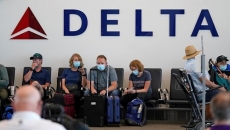HALIFAX - The mass killing in Nova Scotia and the COVID-19 pandemic helped push the number of homicides nationally in 2020 to its highest level in nearly 30 years, Statistics Canada reported Thursday.
The new survey says 743 homicides were reported by Canadian police in 2020 — a figure that was the most since 1991 and includes the 22 victims of a gunman's rampage that began in Portapique, N.S., in April of last year.
"This attack contributed to an uncharacteristically high homicide count and rate for the province of Nova Scotia in 2020 and is also reflected in the increase in firearm-related homicide for the province," the report says. It says the national increase in homicides was mainly driven driven by "notable increases" in Alberta and Nova Scotia.
As a result, the overall number of homicides was 56 more than in 2019, pushing Canada's homicide rate up by seven per cent — from 1.83 homicides per 100,000 population in 2019 to 1.95 per 100,000 population in 2020.
"This marks the highest national homicide rate since 2005," the survey says.
Statistics Canada also noted the "profound impacts on Canadian society of the COVID-19 pandemic," adding that its associated societal and economic changes had contributed to a shift in crime patterns across Canada.
While the Crime Severity Index, which measures the volume and severity of police-reported crime in Canada, decreased eight per cent, the survey said homicide rates increased.
"Risk factors for family violence such as social isolation, reduced income and job loss were amplified amidst the pandemic, potentially leading to increased tension in the home and escalations of violence," the survey states.
Meanwhile, the survey also highlights the rate of Indigenous homicide victims, which was seven times higher than among the non-Indigenous population. The rate for the Indigenous population was 10.05 homicides per 100,000 people, compared with 1.41 per 100,000 for non-Indigenous Canadians.
It says 201 homicide victims in 2020 were First Nations, Métis, Inuit or from an Indigenous identity where the group was not known to police, representing more than a quarter of all victims in Canada.
Figures showed the 163 Indigenous male homicide victims last year was a 24 per cent increase from 2019 and was the highest number since data on Indigenous identity first became available through the homicide survey in 2014.
By contrast, there were nine fewer Indigenous women victims of homicide than in 2019, the first decrease in four years.
"A history of colonization, including residential schools, work camps and forced relocation, profoundly impacted Indigenous communities and families," the survey says. "These factors play a significant role in the overrepresentation of Indigenous peoples in the criminal justice system and as victims of crime."
The survey also found that about one in four homicide victims were designated as visible minorities, with about half — 89 victims — identified as Black.
Ontario accounted for almost half of the homicide victims designated as visible minorities, with 88, the large majority in Toronto. The survey notes that 51 per cent of people living in Canada's most populous city are designated as visible minorities.
"Even with this large population, visible minorities were still overrepresented as victims of homicide ... and accounted for more than two-thirds of homicide victims in Toronto," the survey says.
Calgary and Edmonton were the metropolitan areas with the largest increases in homicides in 2020, with 15 more victims each compared with 2019. Toronto continued to have the highest number of homicides in Canada yet saw the greatest year-over-year decline of all metropolitan areas, with 25 fewer victims in 2020.
The figures also show that Canadian police reported 277 homicides committed with a firearm in 2020 — 15 more than in 2019.
The six per cent increase in the national rate marked the second year in a row that the rate of firearm-related homicides increased in Canada. In 2020, 49 per cent of firearm-related homicides were committed with a handgun.
Statistics Canada says the rate of gang-related homicides decreased by 10 per cent in 2020. There were 148 gang-related killings, a decrease of 14 from 2019.






